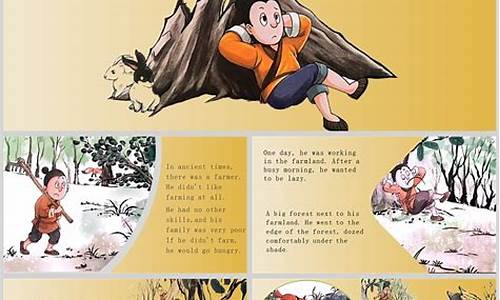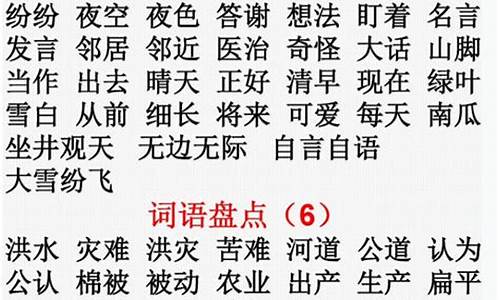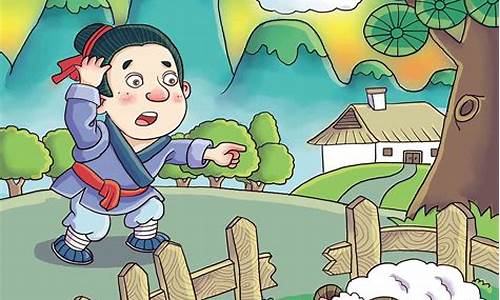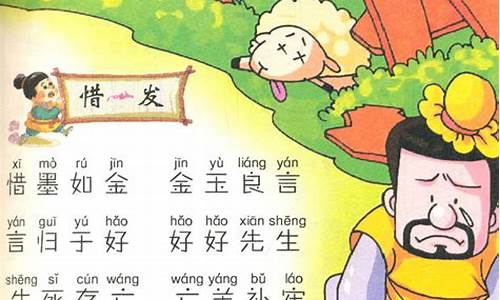您现在的位置是: 首页 > 在线成语解释 在线成语解释
中国成语英语故事_成语英语故事大全简短一点
ysladmin 2024-08-08 人已围观
简介中国成语英语故事_成语英语故事大全简短一点 在接下来的时间里,我将尽力为大家解答关于中国成语英语故事的问题,希望我的回答能够给大家带来一些思考。关于中国成语英语故事的话题,我们开始讲解吧。1.守株待兔成语故事英文版?2
在接下来的时间里,我将尽力为大家解答关于中国成语英语故事的问题,希望我的回答能够给大家带来一些思考。关于中国成语英语故事的话题,我们开始讲解吧。
1.守株待兔成语故事英文版?
2.求中国传统文化的历史经典故事、民间传说、成语故事的英语改编。
3.简单英语中国成语故事30字
4.用英语简写一个中国成语故事(提示:要有记述文的要素,When…?Where…?Who…?What…
5.中国成语故事《九牛一毛》中英文版
6.成语小故事:覆车之戒

守株待兔成语故事英文版?
⑴ 守株待兔的成语故事守株待兔成语故事:
相传在战国时代宋国,有一个农民,日出而作,日入而息.遇到好年景,也不过刚刚吃饱穿暖;一遇灾荒,可就要忍饥挨饿了.他想改善生活,但他太懒,胆子又特小,干什么都是又懒又怕,总想碰到送上门来的意外之财。
奇迹终于发生了。深秋的一天,他正在田里耕地,周围有人在打猎。吆喝之声四处起伏,受惊的小野兽没命的奔跑。突然,有一只兔子,不偏不倚,一头撞死在他田边的树根上。当天,他美美地饱餐了一顿。
从此,他便不再种地。一天到晚,守着那神奇的树根,等着奇迹的出现。
成语“守株待兔”,比喻亡想不劳而得,或死守狭隘的经验,不知变通。
(1)守株待兔成语故事英文版扩展阅读
守株待兔
成语拼音:shǒu zhū dài tù
成语解释:比喻死守狭隘经验;不知变通;或抱着侥幸心理妄想不劳而获。
成语出处:战国 韩韩非《韩非子五蠹》:“宋人有耕田者,田中有株,兔也,触柱折颈而死。”
成语用法:守株待兔连动式;作宾语、定语;含贬义。
成语正音:待,不能读作“dǎi”。
成语辨形:待,不能写作“侍”。
成语辨析:守株待兔和“刻舟求剑”;都含有“不知变通”之意。但守株待兔重在“守”和“待”;形容人不作主观努力;只是存在侥幸心理;想获得意外成功;而“刻舟求剑”偏重于“刻”和“求”;强调虽然主观上努力;但不了解情况变化;不知变通而取错误方法。
近义词:刻舟求剑、墨守成规
反义词:通达权变
成语例子:吾料兄必定出身报国,岂是守株待兔之辈。(明许仲琳《封神演义》第九十四回)
⑵ 成语故事《守株待兔》动画
成语: 守株待兔
拼音: shǒu zhū dài tù
解释: 株:露出地面的树根。原比喻希图不经过努力而得到成功的侥幸心理。现也比喻死守狭隘经验,不知变通。
出处: 《韩非子·五蠹》记载:战国时宋国有一个农民,看见一只兔子撞在树根上死了,便放下锄头在树根旁等待,希望再得到撞死的兔子。
举例造句: 吾料兄必定出身报国,岂是守株待兔之辈! 明·许仲琳《封神演义》第九十四
拼音代码: szdt
近义词:刻舟求剑、墨守成规
反义词: 通达权变
灯谜: 柳
用法: 作宾语、定语;指不知变通
英文: stand by a stump waiting for more hares to e and clash themselves against it--trust to chance and windfalls
故事: 从前宋国有一个农夫在地里干活,忽然从远处跑来一只兔子,它十分慌张,一不小心就撞在树桩上死了。农夫很高兴,捡起这只死兔子回家美美地饱餐一顿。他想每天都有这样的好事就好了,于是他放下农具整天守在那颗树下,一无所获
动画网址网页链接
⑶ 英语版中国成语故事
江郎才尽
Southern Dynasties of Jiang Yan, word Wen-tung, when he was young, became a Dingdingyouming writer, his poems and articles at the time received high acclaims. However, when he is getting older, he has not previously written an article good, but a lot of setbacks. His poems written in prosaic; and pick up a pen-yin grip for a long time, still can not write a word, the occasional inspiration came; poem written, but the textual Kuse, content, plain were pletely useless. So some people to legend, once a boat parked in Chan Jiang Yan-Ling Monastery river and dream of a self-named Zhang Jingyang person; to his followers repay a silk, he would arrest a few feet from her, he is also silk. Thus, his article there will be no wonderful. It was also legend; once the rule of Jiang Yan in the booth sleeping too; dreamed that a person claiming to Guo Pu, walked over to his side, his claim to the pen, said to him: "Man Michie, I he a pen in your place has been a long time, and now should be able to give it to me the bar! "Jiang Yan heard, they dig out from his arms, he is also a five-color pen. Reportedly Since then, Jiang Yan on Evans exhausted and could not write the article in any good.
Jiang Yan's talent has not really run out, but he was an officer after the one hand, as the Chief busy, on the other hand also because of career proud of, without their own write, to sweat, they did not write the. Over time, the article will bring out less, lacking in talent. (Excerpt from "Practical Writing" 1995 No. 8 "I hope," Jiang "was not exactly")
南朝的江淹,字文通,他年轻的时候,就成为一个鼎鼎有名的文学家,他的诗和文章在当时获得极高的评价。 可是,当他年纪渐渐大了以后,他的文章不但没有以前写得好了,而且退步不少。他的诗写出来平淡无奇;而且提笔吟握好久,依旧写不出一个字来,偶尔灵感来了;诗写出来了,但文句枯涩,内容 平淡得一无可取。于是就有人传说,有一次江淹乘船停在禅灵寺的河边,梦见一 个自称叫张景阳的人;向他讨还一匹绸缎,他就从怀中拘出几尺绸缎还他。因此,他的文章以后便不精彩了。又有人传说;有一次江淹在冶亭中睡午觉;梦见一个自称郭璞 的人,走到他的身边,向他索笔,对他说:“文通兄,我有一支笔在你那儿已经很久了,现在应该可以还给我了吧!” 江淹听了,就顺手从怀里取出一支五色笔来还他。据说从此以后,江淹就文思枯竭,再也写不出什么好的文章了。
其实并不是江淹的才华已经用完了,而是他当官以后,一方面由于政务繁忙,另一方面也由于仕途得意,无需自己动笔,劳心费力,就不再动笔了。久而久之,文章自然会逐渐逊色,缺乏才气。(节选自《应用写作》1995年第8期《但愿“江郎”才不尽》)
⑷ 守株待兔成语故事350字
守株待兔
宋国有个农夫种着几亩地,他的地头上有一棵大树,
守株待兔的成语故事
。一天,他在地里干活,忽然看见一只兔子箭一般地飞奔过来,猛的撞在那棵大树上,一下子把脖子折断了,蹬蹬腿就死了。这个农夫飞快的跑过去,把兔子捡起来,高兴地说:“这真是一点劲没费,白捡了个大便宜,回去可以美美地吃上一顿了。”他拎着兔子一边往家走,一边得意地想:“我的运气真好, 没准明天还会有兔子跑来,我可不能放过这样的便宜。” 第二天,他到地里,也不干活,只守着那棵大树,等着兔子撞过来。结果,等了一天什么也没等到。他却不甘心,从此,天天坐在那棵大树下等着兔子来撞死。他等呀等呀,直等到地里的野草长得比庄稼都高了,连个兔子影也没有再见到。
⑸ 守株待兔的成语故事(50——100字左右)
从前宋国有一个农夫在地里干活,忽然从远处跑来一只兔子,它十分慌张,一不小心就撞在树桩上死了。农夫很高兴,捡起这只死兔子回家美美地饱餐一顿。他想每天都有这样的好事就好了,于是他放下农具整天守在那颗树下,一无所获。
(5)守株待兔成语故事英文版扩展阅读
守株待兔
成语拼音:shǒu zhū dài tù
成语解释:比喻死守狭隘经验;不知变通;或抱着侥幸心理妄想不劳而获。
成语出处:战国 韩韩非《韩非子五蠹》:“宋人有耕田者,田中有株,兔也,触柱折颈而死。”
成语用法:守株待兔连动式;作宾语、定语;含贬义。
成语正音:待,不能读作“dǎi”。
成语辨形:待,不能写作“侍”。
成语辨析:守株待兔和“刻舟求剑”;都含有“不知变通”之意。但守株待兔重在“守”和“待”;形容人不作主观努力;只是存在侥幸心理;想获得意外成功;而“刻舟求剑”偏重于“刻”和“求”;强调虽然主观上努力;但不了解情况变化;不知变通而取错误方法。
近义词:刻舟求剑、墨守成规
反义词:通达权变
成语例子:吾料兄必定出身报国,岂是守株待兔之辈。(明许仲琳《封神演义》第九十四回)
⑹ 现代版成语故事《守株待兔》
守株待兔
shǒu zhū dài tù
解释株:露出地面的树根。原比喻希图不经过努力而版得到成功的侥幸心权理。现也比喻死守狭隘经验,不知变通。
出处《韩非子·五蠹》记载:战国时宋国有一个农民,看见一只兔子撞在树根上死了,便放下锄头在树根旁等待,希望再得到撞死的兔子。
结构连动式。
用法用作贬义。一般作宾语、定语。
正音待;不能读作“dǎi”。
辨形待;不能写作“侍”。
近义词刻舟求剑、墨守成规
反义词通达权变
辨析~和“刻舟求剑”;都含有“不知变通”之意。但~重在“守”和“待”;形容人不作主观努力;只是存在侥幸心理;想获得意外成功;而“刻舟求剑”偏重于“刻”和“求”;强调虽然主观上努力;但不了解情况变化;不知变通而取错误方法。
例句美好的生活要靠自己去创造;这样如同~;能有好日子过吗?
英译waitfainswithoutpains
⑺ 中英文版成语故事书。
广州市北京路科技图书馆有得卖!成语典故
⑻ 守株待兔 成语故事 贝瓦
守株待兔 shǒu zhū dài tù
解释: 株:露出地面的树根。原比喻希图不经过努力而得到成功的侥幸心理。现也比喻死守狭隘经验,不知变通。
成语故事:
春秋时代有位宋国的农夫,他每天早上很早就到田里工作,一直到太阳下山才收拾农具准备回家。有一天,农夫正在田里辛苦的工作,突然却远远跑来一只兔子。这只兔子跑得又急又快,一个不小心,兔子撞上稻田旁边的大树,这一撞,撞断了兔子的颈部,兔子当场倒地死亡。一旁的农夫看到之后,急忙跑上前将死了的兔子一手抓起,然后很开心的收拾农具准备回家把这只兔子煮来吃。农夫心想,天底下既然有这么好的事,自己又何必每天辛苦的耕田?
从此以后,他整天守在大树旁,希望能再等到不小心撞死的兔子。可是许多天过去了,他都没等到撞死在大树下的兔子,反而因为他不处理农田的事,因此田里长满了杂草,一天比一天更荒芜。
⑼ 小学一年级英汉双译成语故事:守株待兔
成语故事:宋国有个农夫正在田里翻土。突然,他看见有一只野兔从旁边的草丛里慌慌张张地窜出来,一头撞在田边的树墩子上,便倒在那儿一动也不动了。农民走过去一看:兔子死了。因为它奔跑的速度太快,把脖子都撞折(shé)了。农民高兴极了,他一点力气没花,就白捡了一只又肥又大的野兔。他心想;:要是天天都能捡到野兔,日子就好过了。从此,他再也不肯出力气种地了。每天,他把锄头放在身边,就躺在树墩子跟前,等待着第二只、第三只野兔自己撞到这树墩子上来。世上哪有那么多便宜事啊。农民当然没有再捡到撞死的野兔,而他的田地却荒芜了。因为没能再次得到兔子,农民自己沦为了宋国的笑柄。
英文翻译
During the period of Warring States, many people lived on farming. One day, a farmer found that a hare bumped against a stump and died because it ran so quickly that it did not see the stump. That a hare bumped into the sump was less likely to hen again. However, the farm chose to sit near the stump, waiting for another hare, instead of farming to make a living. Eventually, the farmer starved to death.
Waiting for him
求中国传统文化的历史经典故事、民间传说、成语故事的英语改编。
1.An Apple of Discord争斗之源;不和之因;祸根
An Apple of Discord直译为“纠纷的苹果”,出自荷马史诗Iliad中的希腊神话故事
传说希腊阿耳戈英雄(Argonaut)珀琉斯(Peleus)和爱琴海海神涅柔斯的女儿西蒂斯(Thetis)在珀利翁山举行婚礼,大摆宴席。他们邀请了奥林匹斯上(Olympus)的诸神参加喜筵,不知是有意还是无心,惟独没有邀请掌管争执的女神厄里斯(Eris)。这位女神恼羞成怒,决定在这次喜筵上制造不和。于是,她不请自来,并悄悄在筵席上放了一个金苹果,上面镌刻着“属于最美者”几个字。天后赫拉(Hera),智慧女神雅典娜(Athena)、爱与美之神阿芙罗狄蒂(Aphrodite),都自以为最美,应得金苹果,获得“最美者”称号。她们争执不下,闹到众神之父宙斯(Zeus)那里,但宙斯碍于难言之隐,不愿偏袒任何一方,就要她们去找特洛伊的王子帕里斯(Paris)评判。三位女神为了获得金苹果,都各自私许帕里斯以某种好处:赫拉许给他以广袤国土和掌握富饶财宝的权利,雅典娜许以文武全才和胜利的荣誉,阿芙罗狄蒂则许他成为世界上最美艳女子的丈夫。年青的帕里斯在富贵、荣誉和美女之间选择了后者,便把金苹果判给爱与美之神。为此,赫拉和雅典娜怀恨帕里斯,连带也憎恨整个特洛。后来阿芙罗狄蒂为了履行诺言,帮助帕里斯拐走了斯巴达国王墨涅俄斯的王后---绝世美女海伦(Helen),从而引起了历时10年的特洛伊战争。不和女神厄里斯丢下的那个苹果,不仅成了天上3位女神之间不和的根源,而且也成为了人间2个民族之间战争的起因。因此,在英语中产生了an le of discord这个成语,常用来比喻any subject of disagreement and contention;the root of the trouble;dispute等意义
这个成语最初为公元2世纪时的古罗马历史学家马克·朱里·尤斯丁(Marcus Juninus Justinus)所使用,后来广泛的流传到欧洲许多语言中去,成为了一个国际性成语。
eg: He throwing us an le of discord,we soon quarrelled again.
The dispute about inheriting estate formed an le of discord between them.
This problem seems to be an le of discord between the Soviet union and the USA.
2.The Heel of Achilles 亦作The Achilles' Heel唯一弱点;薄弱环节;要害
The Heel of Achilles直译是“阿基里斯的脚踵”,是个在欧洲广泛流行的国际性成语。它源自荷马史诗Iliad中的希腊神话故事。
阿基里斯是希腊联军里最英勇善战的骁将,也是荷马史诗Iliad里的主要人物之一。传说他是希腊密耳弥多涅斯人的国王珀琉斯和海神的女儿西蒂斯所生的儿子。阿基里斯瓜瓜坠地以后,母亲想使儿子健壮永生,把他放在火里锻炼,又捏着他的脚踵倒浸在冥河(Styx)圣水里浸泡。因此阿基里斯浑身象钢筋铁骨,刀枪不入,只有脚踵部位被母亲的手捏住,没有沾到冥河圣水,成为他的唯一要害。在特洛伊战争中,阿基里斯骁勇无敌,所向披靡,杀死了特洛伊主将,著名英雄赫克托耳(Hector),而特洛伊的任何武器都无法伤害他的身躯。后来,太阳神阿波罗(Apollo)把阿基里斯的弱点告诉了特洛伊王子帕里斯,阿基里斯终于被帕里斯诱到城门口,用暗箭射中他的脚踵,负伤而死。
因此,the heel of Achilles,也称the Achilles' heel,常用以表示a weak point in something that is otherwise without fault;the weakest spot等意思。
eg:The shortage of fortitude is his heel of Achilles.
His Achilles' heel was his pride--he would get very angry if anyone criticized his work.
3.Helen of Troy
Helen of Troy 直译"特洛伊的海伦",源自源自荷马史诗Iliad中的希腊神话故事。
Helen是希腊的绝世佳人,美艳无比,嫁给希腊南部邦城斯巴达国王墨涅俄斯(Menelaus)为妻。后来,特洛伊王子帕里斯奉命出事希腊,在斯巴达国王那里做客,他在爱与美之神阿芙罗狄蒂的帮助下,趁着墨涅俄斯外出之际,诱走海伦,还带走了很多财宝
此事激起了希腊各部族的公愤,墨涅俄斯发誓说,宁死也要夺回海轮,报仇雪恨。为此,在希腊各城邦英雄的赞助下,调集十万大军和1180条战船,组成了希腊联军,公推墨涅俄斯的哥哥阿枷门农(Agamemnon)为联军统帅,浩浩荡荡,跨海东征,攻打特洛伊城,企图用武力夺回海轮。双方大战10年,死伤无数,许多英雄战死在沙场。甚至连奥林匹斯山的众神也分成2个阵营,有些支持希腊人,有些帮助特洛,,彼此展开了一场持久的恶斗。最后希腊联军用足智多谋的奥德修斯(Odusseus)的“木马计”,里应外合才攻陷了特洛伊。希腊人进城后,大肆杀戮,帕里斯王子也被杀死,特洛伊的妇女、儿童全部沦为奴隶。特洛伊城被掠夺一空,烧成了一片灰烬。战争结实后,希腊将士带着大量战利品回到希腊,墨涅俄斯抢回了美貌的海轮重返故土。这就是特洛伊战争的起因和结局。正是由于海轮,使特洛伊遭到毁灭的悲剧,真所谓“倾国倾城”,由此产生了Helen of Troy这个成语。
特洛伊战争的真实性,已为19世纪德国考古学家谢里曼在迈锡尼发掘和考证古代特洛伊古城废墟所证实。至于特洛伊城被毁的真正原因,虽然众说纷纭,但肯定决不是为了一个美女而爆发这场战争的,与其说是为了争夺海轮而打了起来,毋宁说是为了争夺该地区的商业霸权和抢劫财宝而引起战争的。所谓“特洛伊的海伦”,实质上是财富和商业霸权的化身。中国历史上也有过“妲己亡商”,“西施沼吴”等传说,以及唐明皇因宠杨贵妃而招致“安史之乱”,吴三桂“冲冠一怒为红颜”等说法。汉语中有个“倾国倾城”的成语(语出《汉书·外戚传》:‘一顾倾人城,再顾倾人国’。)这里的“倾”字一语双光,既可指美艳非凡,令人倾倒;也可纸倾覆邦国。其含义与Helen of troy十分近似。
在现代英语中,Helen of Troy这个成语,除了表示a beautiful girl or woman;a beauty who ruins her country等意义外,还可以用来表示a terrible disaster brought by sb or sth you like best的意思。
eg:It is unfair that historians always attribute the fall of kingdoms to Helen of Troy.
She didn't think of the beautiful umbrella bought the day before should become a Helen of Troy in her family.Because of this she and her husband quarreled for a long time.
简单英语中国成语故事30字
退避三舍
Retreating about Thirty Miles as Condition For Peace
During the Spring and Autumn Period (770-476 B.C.), Duke Xian of the State of Jin Killed the crown prince Sheng because he had heard slanders about Sheng and believed them. He also sent his men to arrest Chong Er, Shen Sheng and believed them. He also sent his men to arrest Chonh Er, Shen Sheng's brother. Hearing the news, Chong Er escaped from the state of Jin, remaining a fugitive for more than ten years.
After innumerable hardships, Chong Er arrived at the State of Chu at last. King Cheng of the State of Chu treated him with high respect as he would he treated the ruler of a state, believing that he would he a vright fuure.
One day, King Cheng of the State of Chu ge a banquet in honoudr of Chong Er. Suddenly, amid the harmonious atmosphere of drinking and talking, King Cheng of the State of Chu asked Chong Er. "How will you repay me when you return to the State of Jin and become its ruler one day?" After thinking for a moment, Chong Er said, "You he plenty of beauties and attendants as well as jewelry and silk cloth, and the state of Chu abounds in rare brides and animals. What treasure can the State of Jin boast hing to present to your majesty?" King Cheng of the State of Chu said, "You are too modest. Nevertheless, you still he to show your gratitude to me in one way or another, I presume?" Smiling, Chong Er answered, "If I should be fortunate enouge to return to the State of Jin and become its ruler, the State of Jin would be friendly to the State of Chu. If, one day, there should be a war between the two states, I would definitely order my troops to retreat three SHE (one SHE is equivalent to thirty LI. The LI is a Chinese unit of length equivalent to 1/2 kilometre. And, therefore, three SHE is about thirty miles.) as a condition for peace. If, under that condition, you were still not reconciled, I would he to fight with you."
Four years later, as might be expected, Chong Er returned to the State of Jin and became its ruler. He was none other than Duke Wen of the State of Jin famous in ancient Chinese history. Ruled by him, the State of Jin became increasingly powerful.
In the year 533 B.C., the Chu troops and the Jin troops confronted each other in a battle. Faithful to his promise, Duke Wen of the State of Jin ordered his troops to retreat about thirty miles. After retreating, the Jin troops were stationed at Chengpu. Seeing that the Jin troops were retreating, the Chu troops thought that the enemy troops were afraid, and began chasing them. Taking advantage of the Chu troops' arrogance and their talking the Jin troops lightly, the Jin troops concentrated their forces and inflicted a crushing defeat on the Chu troops, thus winning the victory of the battle of Chengpu.
This set phrase, "retreating about thirty miles as a condition for peace," is derived from the Chapter "The Twenty-second Year of Duke Xi" in ZuoZhuan, the famous commentary by Zuo Qiuming on The spring and Autumn Annals. The idea of this set phrase is to give way to somebody in order to oid a conflict.
退避三舍
退缩约三十英里, 在春秋时期(公元前770-476年)的和平条件 ,杜克西安晋国皇太子盛,因为他听说诬蔑盛,并相信他们。他还派他的手下逮捕,沉盛重耳,并相信他们。他还派他的手下逮捕Chonh呃,申生的弟弟。重耳闻讯,逃出了晋国,其余的逃犯十余年。 经过千辛万苦,重耳来到楚国最后。景程的楚国与崇高的敬意,因为他会处理一个国家的统治者对待他,相信,他会有vright fuure。 有一天,景程的楚国设宴招待重耳honoudr 。突然,在一片和谐的气氛中,喝酒和说话,景程的楚国问重耳。“你将如何报答我,当你回到晋国,成为它的统治者吗?” 沉吟了片刻后,重耳说:“你有很多美女和服务员,以及珠宝和丝绸布,楚国盛产罕见的新娘和动物什么珍奇呈现给晋国夸大王呢?“ 楚国的成王说,“你太谦虚了,不过,你仍然有这样或那样的显示您的感谢我,我相信吗?” ,重耳笑着回答,“如果我应该enouge,回到晋国,成为它的统治者,晋国楚是友好国家,如有一天,应该有之间的战争两种状态,我肯定会命令军队撤退三个SHE(一舍等于三十里。LI是一个长度单位,相当于中国1/2公里,因此,她是大约30英里。)和平条件,在该条件下,如果你仍然不甘心,我跟你拼了。“ 四年后,可以预料,重耳回到晋国,成为它的统治者。他以外,没有晋国在中国古代历史上著名的晋文公。他统治,晋国日益强大, 在公元前633年,楚国和晋国的军队在一次战斗中面对对方。忠实晋国的晋文公为了实现他许下的诺言,下令军队撤退大约30英里。撤退后,晋国的军队驻扎在城濮。楚军见晋军后退,以为敌军害怕,开始追逐他们。晋国的军队利用楚军的嚣张气焰和他们坦率的谈话晋国的军队掉以轻心,集中他们的力量和,造成大败楚军,从而赢得了城濮之战的胜利。 这个成语,“撤退约30英里和平条件“,是源于章”第二十二届年在著名评论左丘明“左传”,春秋公羊传“僖公。这组短语的想法是,为了避免冲突,让位给别人。
用英语简写一个中国成语故事(提示:要有记述文的要素,When…?Where…?Who…?What…
1 揠苗助长 :比喻急于求成反而于事无成。
春秋时期,宋国有一个农夫,他总是嫌田里的庄稼长得太慢。 于是,他来到田里,把禾苗一棵一棵地往上拔。第二天,他发现田里的禾苗全都已经枯死了。
2 乘风破浪:形容不怕困难,奋勇前进的精神
古代南北朝的时候,宋国有位将军姓宗名悫,他从小就很勇敢,也很有抱负。有一天,宗悫的叔父问他有什么志向,宗悫回答道:“愿乘长风,破万里浪。”宗悫经过勤学苦练,努力奋斗,终于成为一位能征善战的将军。
3 一衣带水:比喻只隔了一条狭窄水域的,靠得非常近的两地
南北朝的时候,北方的北周和南方的陈国以长江为界。
北周的宰相杨坚,废了周静帝,自己当皇帝,建立了隋朝。
他决心要灭掉陈国,曾说:“我是全国老百姓的父母,难道能因为有一条像衣带那样窄的长江隔着,就看着南方百姓受苦而不拯救他们吗? “
中国成语故事《九牛一毛》中英文版
百度阅读2.0全新发布,更新有礼
好书全免费,You can you up
手机网页游戏 1 宫廷计 3 好玩的单机游 5 艳阳天酒店 2 单机游戏 4 免费单机游戏 6
阅读人数:1465人 页数:3页
An official of the ancient State of Chu awarded a pot of wine to his men after the ceremony of Spring Sacrifice. One man said, “We he only one pot of wine. It's not enough for all of us but sufficient for one. Let's determine who'll he the wine by drawing a snake on the ground. He who finishes first will he the wine.”
The others agreed. Very soon, one man finished his snake. He was about to drink the wine when he saw the others were still busy drawing. He said complacently,“How slowly you are! I still he enough time to add feet to my snke.” But before he finished the feet, another man finished his snke and grabbed the pot from him, saying,“Whoever has seen a snake with feet? Yours is not a snke. So the wine should be mine!” He drank the wine. The man adding the feet to the snake had to give in and could only regret his foolishness.
From that story comes the idiom “Draw a snake and add feet to it”。 Now people use this idiom to illustrate the truth that going too far is as bad as not going far enough.
译文:
楚国有一个官员,在春天祭过了 祖宗之后,便将一壶酒赏给他的办事 人员喝。有人提议:“我们只有一壶 酒,肯定不够我们大家喝的,一个人 喝倒是绰绰有余。我们每人在地上画 一条蛇,谁画得最快,就把这壶酒给 他。” 大家都同意了。
有一个人很快就把蛇画好了。他 正打算喝这壶酒时,看见别人都还忙 着画呢。他就得意扬扬地说:“你们画 得好慢呀,等我再画上几只脚吧!” 他的蛇脚还没画完,另一个人已经把 蛇画好了。那人把酒壶夺了过去 说:“有谁见过长脚的蛇?你画的不是 蛇,这壶酒应该是我的了。”说罢,就 喝起酒来。那个给蛇画脚的人没办 法,只能懊悔自己的愚蠢。
“画蛇添足”这个成语就是从这个 故事来的。现在人们用它来说明这么 个道理:做的过分和做的不够是一样 有害的。
成语小故事:覆车之戒
中国成语故事《九牛一毛》中英文版
Li Ling was a great general during the time of emperor Han Wu-di (hàn wǔ dì汉武帝). He was a very good fighter, and he won every battle.
One time, however, Li Ling's troops were so hopelessly outnumbered by the Huns that although they fought brely, the whole army was soon taken captive.
Li Ling shamefully surrendered for the moment, planning to wait for an opportunity to strike back.
But when news of the surrender reached the capital, the emperor's jealous ministers began to degrade Li Ling in front of the emperor.
What he heard made the emperor so angry that he had Li Ling's wife and mother put to death.
Ze-ma Chian, who had always respected Li Ling, believed that he wouldn't surrender without a reason, and urged the emperor not to believe rumors.
Sz-ma Chian then wrote a long letter to a friend, saying, "I am now in the middle of writing a history book. If I die, it will be as if one ox in a group on nine were to lose a single hair. I am willing to withstand punishment in order to complete this book." Sz-ma Chian finally did finish his book - the very famous Shr-Ji.
This time, the emperor grew angry at Sz-ma Chian, and locking him up, punished him severely.
掩耳盗铃的故事成语英语?
成语故事西汉时期,洛阳人贾谊从小就有天才儿童的美誉,汉文帝听说他很有才学,请他进京担任博士,问他治理国家的看法。贾谊主张要以秦朝灭亡作为镜子,时刻提醒自己要施行仁政,让老百姓休养生息,重视农业生产才能使国家强大。解释比喻先前的失败,可以作为以后的教训。
出处《晋书·庾纯传》纯以凡才,备位卿尹,不惟谦敬之节,不忌覆车之戒矣。
用法作宾语;比喻失败的教训
近义词前车之鉴
近义词前车之鉴造句
你应当把他作为前车之鉴。
You should take warning from his example.
中国的优势在于,他有日本的前车之鉴。
China's advantage is that it learned from Japan's mistakes.
谢国忠认为,这正是中国经济的前车之鉴。
Xieguozhong believe that this is a lesson for the Chinese economy.
但日本的前车之鉴表明了没有什么事是不可避免的'。
But the lesson of Japan is that nothing is inevitable.
新加坡主权财富基金淡马锡在印尼就有过前车之鉴。
One of Singapore's funds, Temasek, has learned that lesson to its cost in Indonesia.
对照欧洲经验的前车之鉴,这些法规只会遭到滥用。
These are open to abuse, as Europe's experience shows.
有他父亲的前车之鉴,他不愿意被引渡一点都不奇怪。
Given his father's fate, it would be understandable if he were reluctant to submit himself to extradition.
不行,我不能让这种事再发生,已经有这种前车之鉴。
s hen again. I seem to he this pattern going on here.
记住前车之鉴,决不相信那些无缘无故给予你帮助的人。
Let that be a lesson to you. Never trust anyone who offers you something for nothing.
可是前车之鉴,还有《圣经》的警告,我们不得不谨慎。
But the historical pattern and Scripture's explicit admonitions should lead us to be highly cautious.
她母亲一再要求她别让自己堕落,并以她本人为前车之鉴。
Her mother was constantly imploring her not to allow herself to decay , as she had done.
这家得克萨斯能源贸易公司的垮台,值得其他公司引为前车之鉴。
The fall of the Texan energy-trading company is the corporate collapse by which all others are measured.
事实上,整个发展趋势就是根据当前情况来推测将来风险的前车之鉴。
Indeed, the whole exercise is a warning of the risks of extrapolating the future from present trends.
反映中国传统文化的成语 历史经典故事 民间传说的英文材料
Ⅰ 日语版中国成语故事:掩耳盗铃耳を掩いて钟を盗む
晋の太夫范氏が灭亡したとき、大钟を手に入れた者がいた。
背负って持って帰ろうと思ったが大きすぎて背负いきれない。 そこで、金槌で小さく砕こうとすると、果たして大钟は鸣り响いた。 この者は人がこれを闻きつけて、钟を夺われはしないかと恐れ、急いで自分の耳をおおった。
自分が闻こえなければ人も闻こえないだろうと考えたのだ。
Ⅱ “掩耳盗铃”的成语故事
春秋时候,晋国世家赵氏灭掉了范氏。有人趁机跑到范氏家里想偷点东西,看见院子里吊着一口大钟。钟是用上等青铜铸成的,造型和图案都很精美。小偷心里高兴极了,想把这口精美的大钟背回自己家去。可是钟又大又重,怎么也挪不动。他想来想去,只有一个办法,那就是把钟敲碎,然后再分别搬回家。
小偷找来一把大锤子,拼命朝钟砸去,咣的一声巨响,把他吓了一大跳。小偷着慌,心想这下糟了,这钟声不就等于是告诉人们我正在这里偷钟吗?他心里一急,身子一下子扑到了钟上,张开双臂想捂住钟声,可钟声又怎么捂得住呢!钟声依然悠悠地传向远方。
他越听越害怕,不由自主地抽回双手,使劲捂住自已的耳朵。“咦,钟声变小了,听不见了!”小偷高兴起来,“妙极了!把耳朵捂住不就听不进钟声了吗!”他立刻找来两个布团,把耳朵塞住,心想,这下谁也听不见钟声了。于是就放手砸起钟来,一下一下,钟声响亮地传到很远的地方。人们听到钟声蜂拥而至把小偷捉住了。
这个成语出自《吕氏春秋·自知》
原文如下:
“范氏之亡也,百姓有得钟者.欲负而走,则钟大不可负;以椎毁之,钟况然有音.恐人闻之而夺己也,遽掩其耳.恶人闻之,可也;恶己自闻之,悖矣。”
白话译文:
范氏灭亡了,有个人趁机偷了一口钟。想要背着它逃跑,但是,这口钟太大了,背不动;于是用槌子把钟砸碎,刚一砸,钟锽锽的响声很大。他生怕别人听到钟声,来把钟夺走了,就急忙把自己的耳朵紧紧捂住。他以为捂住自己的耳朵别人就听不到了,这就太荒谬了。
(2)掩耳盗铃的故事成语英语扩展阅读:
故事寓意:
钟的响声是客观存在的,不管你是否捂住耳朵,它都是要响的。凡是要客观存在的东西,它不会依人的主观意志而改变。有的人对自己不利,或不喜欢的客观存在,取不承认的态度,以为如此,它就不存在了,这和“掩耳盗钟”一样,都是极端的主观唯心主义——唯我论的表现。
如果对客观存在的现实不正视、不研究,取闭目塞听的态度的话,最终便会自食苦果。
Ⅲ 掩耳盗铃的故事成语故事
春秋时候,晋国世家赵氏灭掉了范氏。有人趁机跑到范氏家里想偷点东西,看见院子里吊着一口大钟。钟是用上等青铜铸成的,造型和图案都很精美。小偷心里高兴极了,想把这口精美的大钟背回自已家去。可是钟又大又重,怎么也挪不动。他想来想去,只有一个办法,那就是把钟敲碎,然后再分别搬回家。
小偷找来一把大锤子,拼命朝钟砸去,咣的一声巨响,把他吓了一大跳。小偷着慌,心想这下糟了,这钟声不就等于是告诉人们我正在这里偷钟吗?他心里一急,身子一下子扑到了钟上,张开双臂想捂住钟声,可钟声又怎么捂得住呢!钟声依然悠悠地传向远方。
他越听越害怕,不由自主地抽回双手,使劲捂住自已的耳朵。“咦,钟声变小了,听不见了!”小偷高兴起来,“妙极了!把耳朵捂住不就听不进钟声了吗!”他立刻找来两个布团,把耳朵塞住,心想,这下谁也听不见钟声了。于是就放手砸起钟来,一下一下,钟声响亮地传到很远的地方。人们听到钟声蜂拥而至把小偷捉住了。
望纳,谢谢您!~
Ⅳ 英语故事掩耳盗铃的成语
春秋时侯,晋国贵族智伯灭掉了范氏。有人趁机跑到范氏家里想偷点东西,看见院子里吊着一口大钟。钟是用上等青铜铸成的,造型和图案都很精美。小偷心里高兴极了,想把这口精美的大钟背回自已家去。可是钟又大又重,怎么也挪不动。他想来想去,只有一个办法,那就是把钟敲碎,然后再分别搬回家。
小偷找来一把大大锤,拼命朝钟砸去,咣的一声巨响,把他吓了一大跳。小偷着慌,心想这下糟了,这种声不就等于是告诉人们我正在这里偷钟吗?他心里一急,身子一下子扑到了钟上,张开双臂想捂住钟声,可钟声又怎么捂得住呢!钟声依然悠悠地传向远方。
他越听越害怕,不同自由地抽回双手,使劲捂住自已的耳朵。“咦,钟声变小了,听不见了!”小偷高兴起来,“妙极了!把耳朵捂住不住就听不进钟声了吗!”他立刻找来两个布团,把耳朵塞住,心想,这下谁也听不见钟声了。于是就放手砸起钟来,一下一下,钟声响亮地传到很远的地方。人们听到钟声蜂拥而至把小偷捉住了。
Spring and autumn when the noble Zhi Bo out of fan. Someone took the opportunity to run in fan's house to steal, saw the yard hanging a bell. The bell was cast in high-quality bronze, shapes and patterns are very beautiful. The thief was very glad, want to put this beautiful bell back to their own home. But the clock is big and hey, how also can not move. He thought, there is only one way, that is the bell qiaosui, then moved back home.
The thief found a big iron hammer, desperately toward the clock hit, with a bang, he put a scare. The thief alarm, thinking that this is bad, this is tantamount to telling people that I was stealing the bell here? He was in a hurry, his body suddenly rushed to the bell, open his arms to cover the bell, but how can the bell cover it!The bell is still a long way to the distance.
The more he listened, the more he was afraid, and he was free to pull back his hands, and he tried to cover his ears. "Hey, the sound bees *** all, hear!" The thief hy, "wonderful! Can't you hear the bell over the ear!" He immediately found o pieces of cloth, his ears, thought that in this way nobody could hear the sound of the bell. So he let go and hit the bell, the bell, the bell loudly spread far away. People hear the bell stampede in caught the thief.
Ⅳ 成语"掩耳盗铃"出自何处讲述了一个什么故事
出自秦吕不伟编订的《吕氏春秋·自知》。故事:范氏灭亡了,有个人趁机偷了一口钟。想要背着它逃跑,但是,这口钟太大了,背不动;于是用槌子把钟砸碎,刚一砸,钟锽锽的响声很大。他生怕别人听到钟声,来把钟夺走了,就急忙把自己的耳朵紧紧捂住。他以为捂住自己的耳朵别人就听不到了,这就太荒谬了。
掩耳盗铃 [ yǎn ěr dào líng ]
解释:掩:遮蔽,遮盖;盗:偷。偷铃铛怕别人听见而捂住自己的耳朵。比喻自己欺骗自己,明明掩盖不住的事情偏要想法子掩盖。
出自:秦 吕不伟《吕氏春秋·自知》:“百姓有得钟者,欲负而走,则钟大不可负。以椎毁之,钟况然有声。恐人闻之而夺己也,遽掩其耳。”
译文:百姓有到钟,想要背着它逃跑,但那钟太大不可背负。所以用铁敲碎,钟被碰撞是有声音。怕别人听见声音来抢,所以就捂着自己的耳朵。
(5)掩耳盗铃的故事成语英语扩展阅读
掩耳盗铃近义词
一、欺人自欺[ qī rén zì qī ]
解释:自欺:自我欺骗。欺骗自己,也欺骗别人。
出自:宋·朱熹《朱子语类》卷十八:“因说自欺欺人曰:欺人亦是自欺,此又是自欺之甚者。”
译文:通过对自我欺骗欺骗别人说:欺骗别人也是欺骗自己,这又是自我欺骗的人。
二、掩人耳目[ yǎn rén ěr mù ]
解释:遮掩别人的耳朵和眼睛。比喻用象迷惑人,欺骗人。
出自:宋代无名氏《大宋宣和遗事》亨集:“虽欲掩人之耳目,不可得也。”
译文:虽然想掩饰别人的耳目,但不可能
Ⅵ 掩耳盗铃的成语故事的缩写
春秋时候,晋国贵族智伯灭掉了范氏。有人趁机跑到范氏家里想偷点东西,看见院子里吊着一口大钟。钟是用上等青铜铸成的,非常的美丽和贵重,小偷很想将之偷回家去,可是钟又大又重,他搬不动。他想到了一个办法,那就是把钟敲碎,然后再分别搬回家。
小偷找来一把大锤子,拼命朝钟砸去,可是声音很大,他自己都吓一跳。小偷着急了,心想这下糟了,这钟声不就等于是告诉人们我正在这里偷钟吗?他心里一急,身子一下子扑到了钟上,张开双臂想捂住钟声,可钟声又怎么捂得住呢!钟声依然传向远方。
他越听越害怕,不由自主地抽回双手,使劲捂住自已的耳朵。“咦,钟声竟然变小了!”小偷很高兴,“原来把耳朵捂住不就听不进钟声了!”他立刻找来两个布团,塞住了耳朵,心想这下谁也听不见钟声了。于是就肆无忌惮的砸起来,可是钟声依然传到了很远的地方,很多人敢来将小偷抓住了。
Ⅶ 英文成语故事——掩耳盗铃
耳盗铃 -Ostrich Logic (Yan Er Dao Ling)
At the time when Fan, a nobleman of the state of Jin, became a fugitive, a moner found a bell and wanted to carry it off on his back. But the bell was too big for him. When he tried to knock it into pieces with a hammer there was a loud clanging sound. He was afraid that someone will hear the noise and take the bell from him, so he immediately stopped his own ears.
To worry about other people hearing the noise is understandable, but to worry about himself hearing the noise (as if stopping his own ears would prevent other people from hearing) is absurd.
Ⅷ 成语故事:掩耳盗铃
掩耳盗铃_成语解释
拼音:yǎn
ěr
dào
líng
释义:掩:遮蔽,遮盖;盗:偷。偷铃铛怕别人听见而捂住自己的耳朵。比喻自己欺骗自己,明明掩盖不住的事情偏要想法子掩盖。
成语故事:
从前有一个人,看见人家门口有一口大钟,就想把它偷去。可这钟太重,没法背走,他就取来一个铁锤,想敲碎后一块块偷走。可是还有一个问题,用铁椎砸钟会发出很大的声音,肯定会被人抓做的。他转念一想:钟一响耳朵就能听见,可是如果把耳朵蒙起来,就什么都听不到了!
掩耳盗铃:比喻蠢人自己欺骗自己。
《吕氏春秋·自知》:有得钟者,欲负而走,则钟大不可负。以椎毁之,钟况然有音。恐人闻之而夺已也,遽掩其耳。
姜太公钓鱼
A Willing Victim Letting Himself Be Caught
The story hened around 3000 years ago. There was a wise man named Jiang Ziya living in a village near the Weishui River. He often went fishing at the Weishui River, but he would fish in an unusual way. He hung a straight fishhook, without bait, there feet above the water One day a farmer named Wu Ji went to the river, and saw the strange way of fishing by Ji He laughed and said, “How stupid it is to even think about fishing this way, how many fishes can you get?” Jiang Ziya replied,” lf a fish doesn’t want to live any more, it will come and swallow \the hook itself.” Soon his strange way of fishing was reported to Ji Chang, the Count of the feudal estate .Ji Chang was very interested, and went to visit Jiang personally. Soon they became great friends as Ji Chang realized that Jiang might be a great talent. He invited Jiang to work for him .Jiang helped Ji Chang and his son turn over the Shang Dynasty and establish the Zhou Dynasty. Jiang was given the title of Taigong, so people called him ’’Jiang Taigong.” Today, people use this old idiom “A willing victim Letting Himself Be Caught” to describe someone who willingly falls in a trap or does something regardless of the result.
毛遂自荐
Mao Sui Recommended Himself
In the Warring States Period ,the king of Zhao planned to ask the King of the State of Chu to resist Qin’s attacks together .He sent Pingyuan to Chu convince their king Before Pingyuan left ,a man called Mao Sui showed up ,volunteered to go with him .Pingyuan said ,”I hen’t heard that you he any special abilities ,so what help can you do over there ?” Mao Sui said ,”You put me in a bag ,and my special abilities will stick out like an awl .” So Pingyuan agreed to take Mao Sui to the State of Chu .The negotiations between the two states lasted from morning to noon ,and still couldn’t come to a conclusion. At this time Mao Sui came up and said ,”Chu is a state big enough to rule the world .However ,you are so afraid of Qin. It is such a shame that we Zhao people are embarrassed by you .Now we ask you to combine our troops , but you are acting like a coward !” The king of Chu felt ashamed after Mao Sui’s passionate words .He finally agreed to send troops tp fight Qin . This idiom describes the courage of self –recommending by people with great abilities .
对牛弹琴
Playing the Lute to a Cow
Once upon a time ,there was a man who played the lute very wellOne day ,he played a tune in front of a cow ,hoping that the cow would reciate it .The tune was melodious ,but the cow showed no reaction ,and just kept on eating grass. The man sighed ,and went away . This idiom is used to mock the idea of reasoning with stupid people or talking to the wrong audience .
好了,关于“中国成语英语故事”的话题就到这里了。希望大家通过我的介绍对“中国成语英语故事”有更全面、深入的认识,并且能够在今后的实践中更好地运用所学知识。









